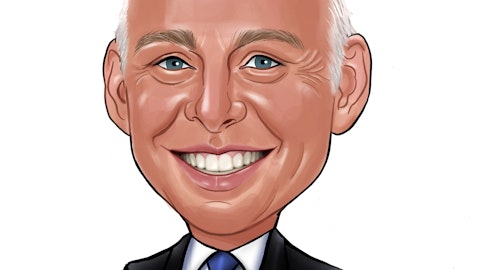William Dossett: That’s very helpful. So another question that I wanted to touch on was from our team regarding factoring in interest rates. On that topic, you’ve all called out price increases for the third and fourth quarters to help compensate for the higher interest rates. Can you discuss MPA’s ability to pass on these higher costs to customers? And as you’ve done with the election not to draw down on the factoring last quarter, what tools can you use to mitigate and manage these higher interest expense?
Selwyn Joffe: Look, there’s not a lot of tools that we see out there to manage the high interest. It is what it is. I mean at the end of the day, we feel that we deserve a fair price and that includes charging for these interest rates. And so these are certainly the accelerated interest rates. And so we have been passing through, it’s never easy to get price increases, but we absolutely must have them. I mean I think every supplier must have them, because I mean this is a true cost that’s a cash cost. And so we need to make up for it. So I think we’ll continue to pass them through and from where we are right now and hopefully they at least stay stable and eventually start moving downwards. But we intend to pass it through. And unfortunately, this is part of the — all costs get eventually passed onto the consumer.
The consumer makes a judgment on whether you will continue to spend on that particular product. In our case, it’s non-discretionary and the value quotient is extremely positive even with the price increase.
William Dossett: And to quickly follow up on that this forthcoming price increases in Q3 and Q4, did they compensate you for the current level of interest rate? And one reason I ask is to be able to understand, what’s the likelihood of future cost increases in terms of marketplace?
Selwyn Joffe: We’re not there yet. I mean, that compensates for a lot of the increase, but we think we should be getting more. I mean again, I’d just say that as an industry participant, I’m not advocating that we’re going to get or not going to get. I’m going to have to wait and see. But again, we believe that these, the factoring rates extend the term for the customer and the customer has to pay for those extended terms, and the working capital costs. And I don’t think I’m unique in that feeling. I think that the entire supply chain feels that way. So while it’s a difficult discussion, I think it’s one that’s pretty clear. And so I think that everybody need strong suppliers out there and the consumer needs to have products.
I mean, if a goal goes down for the consumer, the consumer needs these products to keep their vehicles on the road. If not for companies like ourselves, the car park would be substantially damaged in terms of being able to be repaired. So the entire aftermarket or supply chain needs to be able to — needs to be viable. And that includes the cost of interest.
William Dossett: Thank you for that. And the last question if I may from marketing was just on the framing the opportunity, the longer term opportunity from some of these focuses that are beyond the more mature hard part business, which is the I guess great opportunity in Mexico emerging product lines such as brake related product categories and power management in EV, you mind discussing that?
Selwyn Joffe: Yeah. I think look let me start with the JBT-1, which is this rotating electrical alternator and we’ve started to test them. And we have orders now backorders on that I mean firm orders for over 3,000 units there. That product line has proven to be extremely successful and we’re starting to see more and more benefit from that coming. So that’s a very significant piece of business and we expect double triple or even quadruple that amount of demand to unfold in the next 12 months. So that part of the business, we think is going to be extremely strong and we’re very excited about it. I think we have an industry leading product. And the customers that have embraced it are seeing huge successes from it and are committed to it, so very exciting there.
I think the electric vehicle diagnostics what’s a little more choppy in that CapEx budgets keep getting pushed back or there’s a lot of, sort of, a little bit of negative discussion on the EV growth right now. So again that bodes well for combustion engine perceptions quite frankly. I think the perceptions whatever they are, we’ve got 30 years there’s no at least in the combustion engine opportunity of tailwinds quite frankly. I think it will keep getting better. But anyhow just to talk EV talk for a little bit but the EV market is sporadic. The demand for our testers, our emulators, simulators continues to be good. It’s not as easy to predict quarterly volume on that. Some of these projects are longer. What is exciting though is that Detroit test center, which is a software-as-a-solution test center is seeing a lot of — there’s a lot of demand for that.
In fact that we’ve got reservations now that books up that facility for 120 days out. So that’s pretty exciting. Margins are very good in that business. And electric power management is a fast evolving big demand category. And whether it be for the automotive aftermarket, but we’re seeing a lot of it in drone technology and in aerospace. So I think for longer term down the road that’s going to be quite exciting to us and especially selling computer time for our solutions will be a big part of that. We’ve recently put in a new CEO into that role on electric controller, a heavy technology person. And he’s worked for us in the past but he has come through the ranks and he’s taken over there. And we’re excited about the opportunities there as well.
William Dossett: Thanks so much. Best of luck.
Selwyn Joffe: Thank you very much. Appreciate your interest.
Operator: There appear to be no further questions at this time. Gary Maier, I turn the call back over to you.
Selwyn Joffe: Okay. I just want to say in summary we’re excited about a fiscal second half that’s coming up. It’s supported by strong demand for replacement parts and aging car park, opportunities from multiple replacements has caused down the road longer. We’ve built a solid platform for growth and a non-discretionary aftermarket products serve a critical need for customers and consumers. And most importantly in closing, I want to recognize the contributions from our all of our management team and all of our team members who are focused every day on providing the highest level of service. We’re all committed to being the industry leader for parts and solutions that move our world today and in the future. And we thank everybody for your continued support and thank you again for joining us for the call. And we look forward to speaking with you when we host our fiscal 2024 third-quarter call in February and in our investor conferences. So thank you very much.
Operator: Thank you. This concludes today’s conference call. We thank you for your participation. You may now disconnect.
Follow Motorcar Parts Of America Inc (NASDAQ:MPAA)
Follow Motorcar Parts Of America Inc (NASDAQ:MPAA)
Receive real-time insider trading and news alerts



